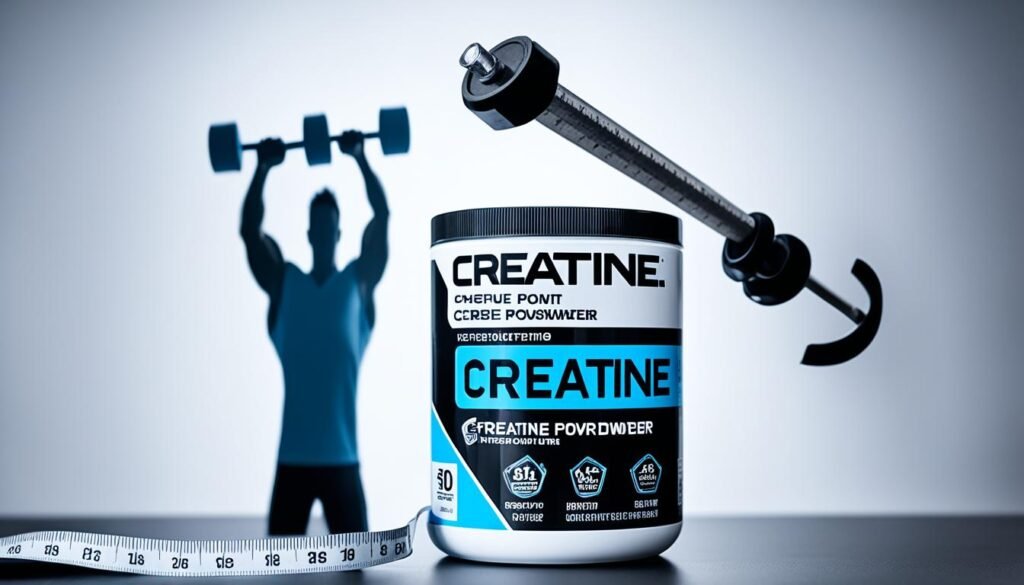Get our FREE E-Book HERE - 120 TIPS for Losing Weight & Bonus Tips for Postpartum Weight Loss & Dad’s Postpartum Experience
Exploring Fascinating Creatine for Weight Loss Benefits

Did you know that creatine, a popular supplement known for its muscle-building properties, can also be a powerful ally in your weight loss journey? That’s right, creatine is not just for bodybuilders and athletes. Research suggests that incorporating creatine supplements into your weight loss regimen can offer a range of benefits, from enhanced fat burning to improved exercise performance.
In this article, we will dive into the fascinating world of creatine for weight loss benefits. We will explore how creatine affects body composition, debunk common myths surrounding its use, and provide practical tips for incorporating creatine into your weight loss regimen. So, if you’re looking for a way to optimize your use of creatine for weight loss results, keep reading to discover how creatine can be your secret weapon.

Key Takeaways:
- Creatine supplements can support weight loss efforts by promoting fat-burning and enhancing exercise performance.
- Contrary to popular belief, creatine does not cause excessive water retention.
- Understanding the different types of creatine and the science behind its effects on the body can help you make informed decisions about supplementation.
- Personalizing your creatine intake and staying hydrated is crucial for maximizing its benefits.
- Taking creatine for weight loss is not the only reason why someone should use it. Creatine offers a range of health benefits beyond weight loss, including improved energy levels, enhanced muscle functionality, and potential neurological benefits.
Understanding Creatine and How It Affects Body Composition
In this section, we will provide a comprehensive understanding of creatine and its impact on body composition. We will explain the role of creatine in muscle function and explore the different types of creatine supplements available in the market. Additionally, we will dive into the science behind the phosphocreatine system, which is responsible for energy production during high-intensity exercise. Finally, we will address the common misconception that creatine causing water retention and provide the truth behind this myth.
What is Creatine and Its Role in Muscle Function?
Creatine is a naturally occurring compound that plays a crucial role in muscle function. It is found in small amounts in various foods, such as meat and fish, and can also be obtained through dietary supplements. When you engage in physical activities that require short bursts of energy, such as weightlifting or sprinting, your body relies on creatine to provide the necessary fuel.
Different Types Of Creatine
There are various types of creatine supplements available, each with its unique characteristics. The most common form is creatine monohydrate, which has been extensively studied and proven to be effective in enhancing performance and supporting muscle growth. Other types include creatine hydrochloride (HCL), creatine ethyl ester (CEE), and buffered creatine, which claim to have better absorption and reduced side effects. While these alternative forms may have their merits, creatine monohydrate remains the gold standard.
Phosphocreatine System: The Science Behind Energy Production
The phosphocreatine system is a biological mechanism that allows for rapid energy regeneration during high-intensity activities. When you exercise intensely, your muscles quickly deplete their energy stores in the form of adenosine triphosphate (ATP). Creatine contributes to the replenishment of ATP by recycling adenosine diphosphate (ADP) back into ATP through the phosphocreatine system. This system plays a vital role in supplying energy, especially during short bursts of intense activity.
Myths vs. Reality: Does Creatine Cause Water Retention?
One common myth surrounding creatine is its alleged role in water retention. Some people believe that creatine causes bloating and weight gain due to its ability to increase water content in muscles. However, research shows that any weight gain associated with creatine supplementation is primarily due to increased muscle mass, not water retention. Creatine may cause a slight increase in water content within the muscle cells, but it does not lead to bloating or excessive water retention in the body.
Creatine for Weight Loss: Separating Fact from Fiction
In this section, we will focus specifically on the relationship between creatine and weight loss. We will explore the weight loss potential of creatine and provide practical tips for incorporating creatine into your weight loss regimen. Additionally, we will discuss the future of creatine as a weight management supplement.
Is Creatine Good for Weight Loss ?
Creatine has gained attention in the fitness community for its potential to support weight loss. While creatine is primarily known for its benefits in increasing muscle strength and power, recent research suggests that it may also have a role in weight management. Studies have shown that creatine supplementation can increase muscle mass, boost metabolism, and improve overall body composition, making it a potential aid in achieving weight loss goals.
Practical Tips for Incorporating Creatine into Your Weight Loss Regimen
If you’re considering incorporating creatine into your weight loss journey, there are a few important factors to keep in mind. Here are some practical tips to help you make the most of creatine for weight loss:
- Start with a small dosage: Begin with a low dose of creatine and gradually increase it to assess your tolerance and avoid any side effects.
- Combine with exercise: Creatine works best when combined with regular exercise. Incorporate both resistance training and cardiovascular exercises into your routine.
- Maintain a balanced diet: Using creatine for weight loss is not by itself a magic solution. It should be combined with a balanced diet that supports your overall calorie and nutrient needs.
- Stay hydrated: Creatine can draw water into your muscles, so it’s essential to stay adequately hydrated to prevent any potential dehydration or water retention.
The Future of Creatine as a Weight Management Supplement
As research on creatine continues to evolve, the future looks promising for its potential as a weight management supplement. The combination of creatine’s ability to increase muscle mass and improve metabolism makes it an intriguing option for individuals looking to optimize their weight loss efforts. However, further studies are needed to fully understand the long-term effects and potential benefits of incorporating creatine into weight management strategies.

With ongoing research and advancements in the field of sports nutrition, the future of creatine as a weight management supplement holds exciting possibilities. As always, it’s essential to consult with a healthcare professional or registered dietitian before starting any new supplementation regimen, especially if you have any underlying health conditions.
What Are The Health Benefits Of Creatine?
In this section, we will explore the various health benefits of creatine supplementation. Creatine is a naturally occurring compound that plays a crucial role in energy production within the body. By increasing the levels of creatine in your muscles, you can experience a range of positive effects on both your physical and mental well-being.
Boosting Energy Levels
Creatine has been shown to significantly boost energy levels, making it a popular choice among athletes and those engaging in high-intensity exercise. By enhancing the body’s ability to regenerate adenosine triphosphate (ATP), the primary source of energy for muscle contractions, creatine supplementation can increase energy levels, allowing you to push harder and go further during your workouts.

Promotes Muscle Functionality
In addition to its energy-boosting properties, creatine also promotes muscle functionality. It helps to increase muscle strength and power, enabling you to lift heavier weights and perform explosive movements with greater ease. By enhancing muscle functionality, creatine supplementation can aid in improving overall athletic performance and enhancing muscle endurance.
Enhances Athletic Performance
Creatine supplementation has been repeatedly shown to enhance athletic performance, particularly during short-duration, high-intensity activities. Whether you’re a sprinter, or weightlifter, or participate in team sports that require quick bursts of energy, creatine can give you that competitive edge by improving your speed, power, and agility.
Boosts Muscle Development
If you’re looking to increase your lean muscle mass, creatine supplementation can help you achieve your goals. By promoting water retention in muscle cells and increasing protein synthesis, creatine has been shown to support muscle growth and development. This can result in improved muscle tone, increased muscle size, and enhanced overall body composition.
Alleviate Symptoms Related to Parkinson’s Disease
Research suggests that creatine supplementation may benefit individuals with Parkinson’s disease. Studies have shown that creatine can help alleviate symptoms such as muscle stiffness, tremors, and dyskinesia, which are common in individuals with this neurodegenerative disorder. While further research is needed, creatine shows promise as a complementary therapy for managing Parkinson’s disease.
Might Combat Neurological Health Conditions
Creatine has been studied for its potential in combating various neurological health conditions. The supplementation of creatine may help protect and support brain health, potentially reducing the risk of cognitive decline and neurodegenerative diseases such as Alzheimer’s and Huntington’s disease. While more research is needed, the preliminary findings are promising.
Controls Blood Sugar Levels
Emerging evidence suggests that creatine supplementation may play a role in controlling blood sugar levels. Research has shown that creatine can improve glucose metabolism, enhance insulin sensitivity, and promote glycemic control. This makes it a potentially valuable supplement for individuals with diabetes or those at risk of developing the condition.
Boosts Brain Function
Not only does creatine support physical performance, but it may also have cognitive benefits. Research indicates that creatine supplementation can enhance brain function and improve cognitive performance, particularly in tasks that require short-term memory, processing speed, and mental fatigue resistance. By boosting brain function, creatine can help you stay focused and mentally sharp.
Alleviate Mental and Physical Fatigue
Feeling mentally and physically fatigued after a long day or a strenuous workout? Creatine might be the solution. Research suggests that creatine supplementation can alleviate both mental and physical fatigue, helping you stay alert and energized throughout the day. By replenishing ATP stores and supporting energy production, creatine can combat exhaustion and enhance overall well-being.
Optimizing Creatine Dosage for Maximum Fat Loss
To achieve maximum fat loss benefits from creatine supplementation, it is important to optimize your dosage. Every individual is unique, and personalizing creatine intake based on specific factors can enhance its effectiveness.
Personalizing Creatine Intake: Factors to Consider
When determining your creatine dosage, there are several factors that you should take into consideration:
- Your weight: Adjusting the dosage based on your body weight helps ensure you are getting the right amount of creatine for your individual needs.
- Your activity level: If you are engaging in intense physical activity or exercise regularly, you may require a higher dosage to support your energy demands.
- Your individual goals: Whether you are looking to lose weight, gain muscle, or improve athletic performance, tailoring your creatine intake can help you achieve your specific goals.
The Importance of Hydration when Supplementing with Creatine
Hydration plays a crucial role when supplementing with creatine. It is essential to drink an adequate amount of water throughout the day to maintain optimal hydration levels. This supports the effectiveness of creatine in maximizing fat loss and overall performance.

Maintenance Dosage vs. Loading Phase: What Works Best?
One of the key considerations when optimizing creatine dosage is whether to follow a maintenance dosage or a loading phase. A maintenance dosage involves consuming a lower amount of creatine over an extended period, while a loading phase involves higher initial dosages followed by a subsequent reduction.
Studies show that both approaches can deliver effective results. However, it is important to note that the loading phase may lead to temporary water weight gain due to increased creatine levels in the muscles.
To determine the best approach for you, consider your individual needs, preferences, and tolerance to potential side effects. Consulting with a healthcare professional or nutritionist can also provide personalized guidance.
Conclusion
As we wrap up this article, it’s evident that creatine holds immense potential as a supplement for weight loss. Throughout our exploration, we have uncovered the numerous benefits that creatine can offer individuals on their weight loss journey. From boosting energy levels to promoting muscle functionality, creatine has shown its effectiveness in enhancing athletic performance and muscle development.
Contrary to popular belief, creatine does not cause water retention, debunking a common myth. Instead, it aids in optimizing body composition by increasing muscle mass and reducing body fat. To maximize the benefits of creatine, it’s important to personalize your intake based on factors such as weight, activity level, and goals.
Remember, hydration plays a vital role when supplementing with creatine, so make sure to prioritize proper fluid intake. Whether you choose a maintenance dosage or a loading phase, finding the right balance is key to achieving your desired results.
So, if you’re embarking on a weight loss journey and looking for a supplement that can potentially help you reach your goals, consider incorporating creatine into your routine. With its proven benefits and the ability to optimize your body composition, creatine can be a valuable asset in your quest for a healthier and fitter you.
FAQ
What are the benefits of creatine for weight loss?
How does creatine affect body composition?
What are the different types of creatine available?
How does the phosphocreatine system contribute to energy production?
Does creatine cause water retention?
What is the weight loss potential of creatine?
How can I incorporate creatine into my weight loss regimen?
Is creatine considered a weight management supplement?
What are the health benefits of creatine supplementation?
Can creatine help alleviate symptoms related to Parkinson’s disease?
Does creatine play a role in controlling blood sugar levels?
What factors should be considered when personalizing creatine intake?
How important is hydration when taking creatine?
What is the difference between a maintenance dosage and a loading phase?
Source Links
- https://www.ncbi.nlm.nih.gov/pmc/articles/PMC7739317/
- https://www.ncbi.nlm.nih.gov/pubmed/22297802
- https://www.ncbi.nlm.nih.gov/pmc/articles/PMC2048496/
- https://www.ncbi.nlm.nih.gov/pubmed/25946994
- https://www.ncbi.nlm.nih.gov/pubmed/11985880
- http://www.sciencedirect.com/science/article/pii/S0896844610001671
- https://www.ncbi.nlm.nih.gov/pmc/articles/PMC3479057/
- https://www.ncbi.nlm.nih.gov/pubmed/15142023
- https://www.ncbi.nlm.nih.gov/pubmed/15142029
- https://www.ncbi.nlm.nih.gov/pmc/articles/PMC5469049/
- https://www.ncbi.nlm.nih.gov/pmc/articles/PMC7871530/







